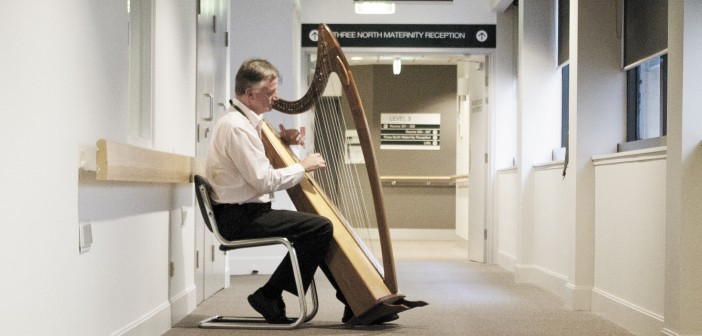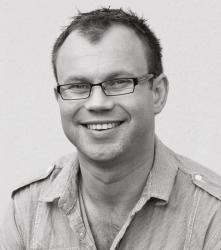There is a well-worn expression in music that says: the instrument is an extension of the soul. While that may sound like a cliché, those who saw Jimi Hendrix in full flight on stage, or have listened to a recording of Miles Davis will understand it’s meaning. In those moments, the musician does far more than just ‘play an instrument’; they let their personality come out in the way they perform and what they offer to those who are listening.
To see Peter Roberts play his harp is a thing of great beauty and, dare I say it, an extension of his soul. While I fear he may not be comfortable being put in the same conversation as the likes of Hendrix or Davis, the compassion and dignity he offers when he performs is clearly part of the man in personality – and it goes far beyond merely playing an instrument. I hope he would accept that as compliment rather than a musical comparison.
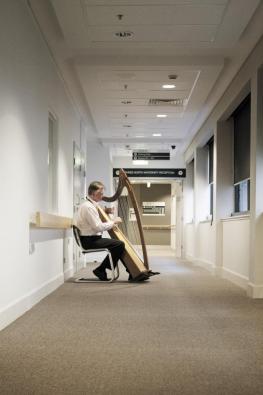
The majority of Peter’s performances have a noticeable difference from most other musicians – they are generally conducted in a hospital. Combining beautiful skill with personal empathy, he plays for patients in need, providing comfort at a vulnerable time.
It is a genuinely lovely service to provide and a joy to watch. At the time I went to see Peter, he – and the people of the hospital – had very generously organised for me to sit in while he played at the premature baby ward. There may not have been a rock-star entrance – and certainly I don’t think many musicians start a performance with a ritualistic dose of hand sanitiser – but the reception he received from the people in the ward indicated something quite special.
Open to ideas
As extraordinary as it is to witness the interaction between patient and musician, what makes Peter’s story even more remarkable is the journey that he took to get here. He played several instruments but had no formal training in music and only decided to go down this path in his mid 40s.
“I had a furniture business for 18 years and I really did enjoy it,” Peter explains. “My parents had a retail business and I’d grown up with that. I’d gone on to run my own quite successfully – but when I reached about 45 years of age I just hit a point where I didn’t know I could keep going.”
Despite his frustrations, Peter did not act immediately. With a strong business spread across multiple stores and a number of staff employed, he knew he had a good life that was providing for his family.
“I sat on this feeling for three years. Eventually, my wife could see how unhappy I was and encouraged me to do something about it. Knowing I had that support was very important, but the problem was… I really had no idea what to do.”
For many people, this feeling is one of the most frightening you can imagine, but such is Peter’s wonderful outlook on life that he took it as a remarkable opportunity.
“I think that was the breakthrough moment I needed,” he says. “By not having a single idea of what I wanted to do, I suddenly became open to any idea. I wasn’t restricted or blinkered by what I thought I must do in that position.”
So open was Peter that the inspiration actually came from an article given to him by a friend.
“It was quite an interesting moment,” he explains. “My friend gave me this newspaper clipping saying he thought I would like it as it combined music and spirituality. The strange part to me was up until that point I didn’t actually realise my friends thought of me in that way.
“So I read the article and thought it was amazing. It was about these people who were being trained to play live music at the bedside of terminally ill patients as a means of providing comfort. It was using music in a practical manner that was also beautiful.
“I thought it was just extraordinary, but I didn’t know what to do with it. The course was in another country and I still had a successful business here, but I was just drawn by the beauty of what they were doing.”
Peter was encouraged to put in an application, but did so with the thought that he could do it by correspondence. As it turns out, that was never an option, but when he was invited to go over to America for an interview he decided to have a look.
“I was quite torn. On one level I was telling my staff in Australia that I was going over for a look and would be back soon, but I was also getting more and more excited at the thought internally.”
Over in America, Peter sat in on lectures and tried to absorb as much about the course as he could. He was interviewed and selected as one of only 22 students (approximately 120 applied). Furthermore, he was one of only a handful who had no experience in playing the harp or had never studied music previously.
“To this day I’m not entirely sure why I was selected, but they were as much interested in why we all wanted to do the course as they were in our existing skill set, so I must have got across my desire to be part of it.”
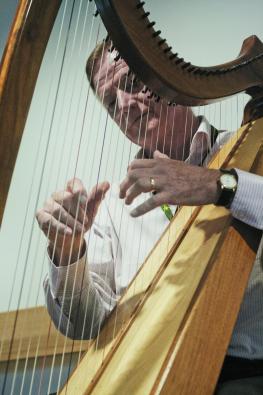
Across the Atlantic
Obviously Peter accepted the offer and the family decided to pack up their lives and join him in America.
“The original plan was based around the fact that the school was going to organise a visa for me. That way, we could all move over and pick up a relatively normal life for a couple of years,” explains Peter.
“I didn’t know it at the time but I was the first international student to go through the course and there were, unfortunately, constant problems with the visa. We were told repeatedly that it would all be fine so we kept making our plans and preparing to move there. As it turns out, at the very last minute the visa never came through, which meant we were severely restricted. My wife is a nurse and we had planned for her to work at the hospital, but without the correct visa she wasn’t allowed. We’d even thought that I could get part-time work to help supplement some income, but that wasn’t possible either.”
The end result was that for the two years he attended the school Peter and his family had to live off savings, churning through a substantial amount of money in the process. This would probably be enough to make most people turn around and head home, yet Peter’s response shows a calm and refreshing honesty.
“In hindsight, I think it probably worked to my advantage. Through the whole process I always felt like I was keeping one hand on the security of my previous life, but it gradually eroded through the process.
“I think if anyone had asked you to give up that much from the outset, you probably wouldn’t go down the path – so perhaps it was the only way I could let go of it.
“It was too big a change for me to simply let go and throw all my eggs in one basket – despite the fact that is what essentially ended up happening.”

The learning process
The course was an eye-opener. Despite being very excited and dedicated to the philosophy, Peter did not have any experience in playing the harp.
“I felt like an oaf!” he says laughing. “I had these big hands and had never played a harp before, and was paired with this elegant, lovely teacher who seemed to be so delicate in everything she did. I did feel a little out of place, but the training was so intense that you learned quickly and became consumed in the course.”
Intense might be an understatement. Private tuition was held every week and guest lecturers from all religious denominations offered personalised insight.
“We had voice and harp lessons every week and the lecturers were fascinating; we had anthropologists, rabbis, priests, Buddhist monks, doctors, nurses and a wide range of people from all sectors of society. It was a very clever way to broaden our perspective so we wouldn’t just bowl into a hospital room without the appropriate sensitivity.
“They called us ‘contemplative musicians’. We were taught to offer the music in a careful, thoughtful manner; not just walking into a room and playing a few tunes you’ve learnt along the way. You’re challenged to think about what is going to work in that situation so you can truly make a difference to the person in need. I felt like it was such a complete learning process that I was able to engage with the course and really look forward to every class.”
Returning to Australia
Even when the Roberts’ family returned home, Peter still had a share of the furniture business, but he knew he could no longer work within it.
“After all that time and those amazing experiences I was a different person, so when we came back to Australia I knew I couldn’t keep working in my previous job. As it turns out, my business partner was interested in doing other things as well, so we closed the business and I set about trying to establish a livelihood through using music in this way.”
The challenge was how he could provide an income from playing.
“The system in America is very good. Because we were working with such vulnerable people facing the end of their lives, there were a number of parties involved, such as the hospital, nursing homes and hospices. They all contribute to an umbrella fund that reimburses the organisation so that the person who receives the care is not charged. It’s a lovely structure that shows genuine compassion. Essentially, it becomes a gift from the community to the individual in their final days.
“I came back to Australia with this great notion of how it should be and thought hospitals and other facilities would see the beauty in it and establish a similar method.”
Unfortunately, Peter had great trouble getting others to share his vision and even now – 15 years on – he continues to play free of charge.
“Despite the fact that the system wasn’t forthcoming in supporting my ideas, there was still a lot of interest around it all. There aren’t that many people in Australia who play the harp and that generates its own curiosity. I was determined to try and keep playing, and if I couldn’t find someone to support this ideal then I knew I had to find other ways to produce an income.”

The battle to be heard
“You would probably say it’s the businessman inside me that saw an opportunity. I started importing harps and components of harps and even started working with a local joiner and carpenter. I would assemble them, polish them, string them and sell them to get some money coming in to support my family.”
That led to maintenance and restoration work, as well as teaching and the assembly of a harp group. He even ventured – reluctantly at first – into making several recordings and has done more presentations than he can remember.
There is also a newly written book available next year which documents his amazing journey in full detail and delves into a study that was undertaken to assess the effects of Peter’s harp playing (the results were so extraordinary that they surprised even him).
These many different activities allowed Peter to continue his playing in medical settings, offering it where needed. While it was undoubtedly exhausting, he says he was genuinely happy and had found satisfaction in his life.
Eventually – through a personal contact and a lot of generous help from a Melbourne law firm – Peter founded a non-profit charity in order to continue his work in a more organised and logical manner. He named it The Institute of Music In Medicine (IMIM).
“I figured that if I was going to continue to play for these people without a fee, I needed some structure around how it would work. I was enjoying all of these other elements I was doing, but it was becoming exhausting and it wasn’t allowing me to spend as much time playing for patients – which is where I get the most satisfaction.”
Although it did take almost 12 months to establish the framework for his charity, it was unquestionably worth the effort. As he began to build a name for himself and the work he was doing, people had begun offering him donations, with one man suggesting directly that he should set up the non-profit entity so those donations could be claimed on tax.
“I am now employed part time by two hospitals. People in these facilities are not being charged for my services – because of the non profit charity neither is anyone else – so I’ve ended up with exactly what I was after 15 years ago; albeit in a different format to how I envisaged it.”
To me – this is Peter’s greatest achievement. Much can be said about the sacrifices he and his family made in giving up a comfortable life to take on something that had no guarantee, and while he has made it a success, it should never be underestimated how much work went into it.
For such a gentle and soothing man, there is clearly a passion and determination that lies within. To take a plunge is one thing – but to see it through with hard work and dedication is truly inspiring.
The fact that he can now find peace in his own life by offering peace to others is the perfect completion of such a dream.
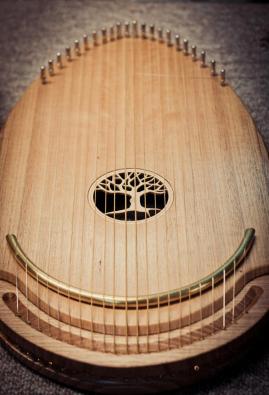
A word from the audience
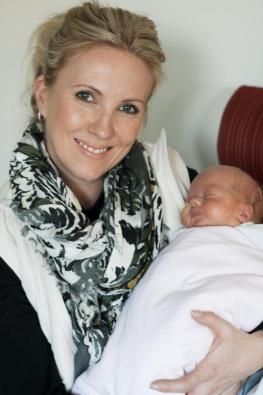
The joy Peter brings his patients and their families is truly lovely to watch. When I entered the premature ward to interview Peter, he was positioned in the
corner where one of the mothers, Samantha, had generously allowed me to sit in while he played for her daughter Matilda.
He managed to portray a completely gentle nature, from the way he moved and played, to the manner in which he spoke to Samantha. And as he positioned the harp and started to delicately play the strings I’m sure I saw Matilda’s body relax.
Matilda was born nine weeks and one day premature and at an incredibly small 1.3kg (2lb 15oz). When I came to complete the article, it was wonderfully pleasing to hear that Samantha and Matilda were happily in the family home – now much healthier at 2.75kg (6lb 1oz).
“Peter was an absolute joy to have in the hospital not only for the beautiful music he played but his genuine care of both the babies and mothers,” Samantha says. “When he played I noticed Matilda’s breathing slow down and her facial expressions seemed to relax – she was certainly very calm.
“I know Matilda thoroughly enjoyed his visits and she wasn’t the only one. Before we were discharged I purchased a copy of his CD because his music soothed her in the hospital, and I’d hoped it would have the same affect transitioning her into her new environment. I’m glad I did, to this day Peter’s beautiful music calms my darling girl … and her mother.”
____________________________________________
The Reverie Harp
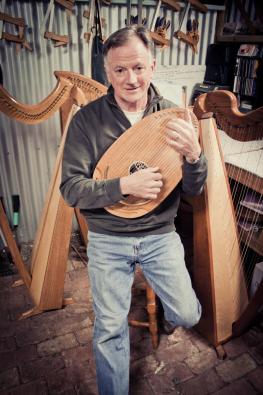
Peter started assembling and working with harps as a means of generating income. Although there is not such a pressing need to continue that work, Peter does still enjoy time in his shed, working on his harps.
His greatest joy in the shed at the moment is an instrument conceived by Peter. He calls it the Reverie Harp.
From an outsider’s point of view it looks like the perfect culmination of his last 15 years. This small, hand-held harp has been specially designed so that gentle strumming will always produce an uplifting sound progression. The small size and rounded back has been created so the user can hold the harp into their chest, feeling the beautiful vibrations and rhythmic sensations while strumming the strings.
It encompasses the element of music with the beauty that anyone can play it. Ultimately, it is making his work mobile and spreading it further than any one man could do.
“I know there’s enormous potential in that instrument – purely in a sense of what it can provide someone. I’m very proud of it,” says Peter.
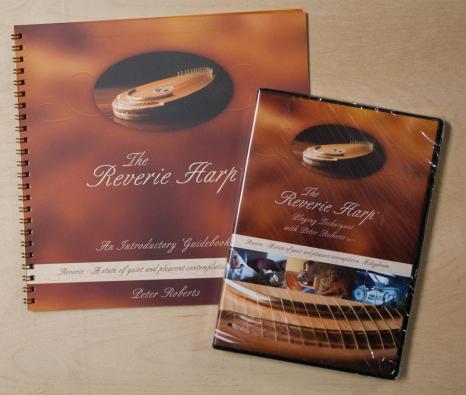
If you would like to know any more about Peter’s work or the wonderful Reverie Harp, go to www.robertsmusic.net

